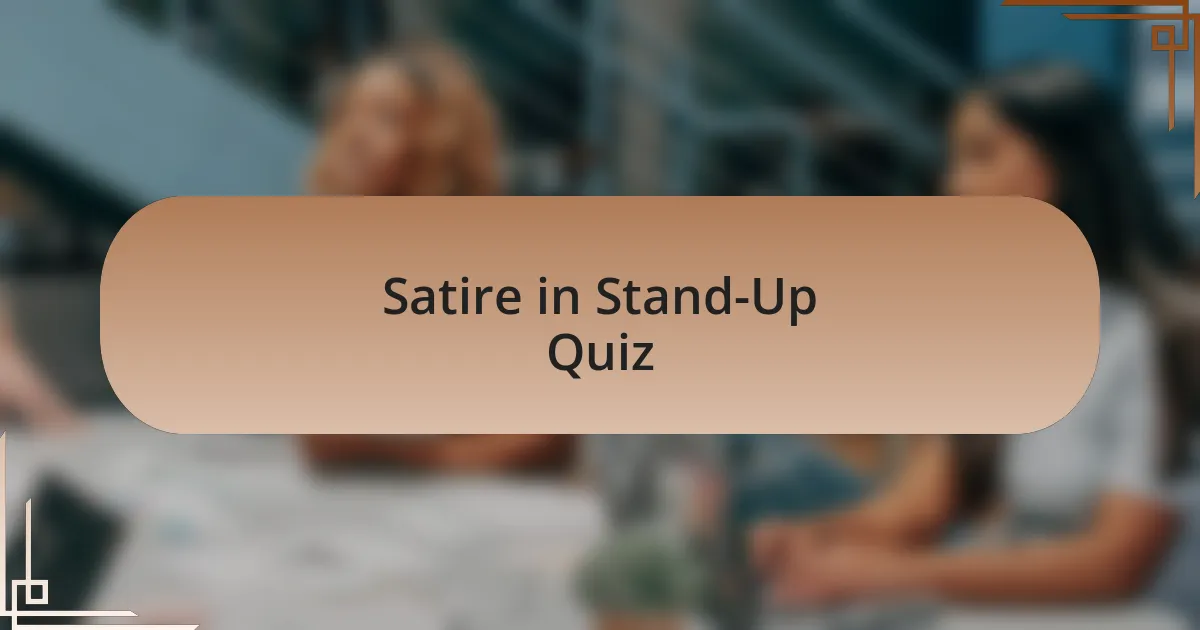Start of Satire in Stand-Up Quiz
1. What is satire in stand-up comedy?
- Satire in stand-up comedy solely focuses on physical appearance and light-hearted mockery.
- Satire in stand-up comedy makes fun of comedians` personal lives and backgrounds without deeper critique.
- Satire in stand-up comedy tells jokes without addressing any social or political themes whatsoever.
- Satire in stand-up comedy uses wit and irony to critique societal issues and often aims to persuade the audience to pursue social change.
2. Who is a notable satirical stand-up comedian?
- George Carlin
- Ellen DeGeneres
- Chris Rock
- Jerry Seinfeld
3. What type of satire is used by George Carlin?
- Juvenalian satire
- Romantic satire
- Light-hearted satire
- Parodic satire
4. What is an example of a satirical stand-up comedy special?
- Comedy Central Roast of Justin Bieber
- The Office: A Sitcom Special
- American: The Bill Hicks Story
- Friends Reunion Special
5. How does satire differ from teasing in stand-up comedy?
- Teasing critiques societal issues and aims for social change through humor.
- Satire focuses on light-hearted jokes about physical attributes without depth.
- Satire uses the comic to go against power and its oppressions, while teasing limits itself to shallow parody of physical appearance.
- Teasing is a serious commentary on political power dynamics and injustice.
6. What is the purpose of satire in stand-up comedy?
- The purpose is to only make fun of individual comedians` lives and experiences.
- The purpose is to persuade the audience to pursue social change by critiquing societal issues.
- The purpose is to entertain without any deeper meaning or critique.
- The purpose is to create awkward silences and discomfort among the audience.
7. What is an example of a satirical stand-up comedian who uses dark humor?
- Jerry Seinfeld
- Kevin Hart
- Jim Gaffigan
- Anthony Jeselnik
8. What is the term for the subversive character of satire?
- Moral dimension
- Light-hearted banter
- Comic relief
- Physical humor
9. Who is Dario Fo, and what did he say about satire?
- Dario Fo is a children`s author who wrote fairy tales about satire.
- Dario Fo is a mathematician who calculated the humor in satire.
- Dario Fo is a famous chef known for his spicy dishes about satire.
- Dario Fo is a Nobel laureate satirical playwright who said that real satire arouses an outraged and violent reaction.
10. What is an example of a satirical news show?
- The Voice
- Saturday Night Live
- America`s Got Talent
- The Daily Show
11. What is the term for the form of simple buffoonery that is not satirical?
- Farce
- Sfottò
- Satire
- Slapstick
12. Who said, `Humour is essential to a successful tactician, for the most potent weapons known to [people] are satire and ridicule`?
- Oscar Wilde
- George Carlin
- Mark Twain
- Saul Alinsky
13. What is an example of a satirical film?
- Finding Nemo
- Sorry to Bother You
- The Lion King
- Titanic
14. What is the equisapiens in `Sorry to Bother You`?
- Aliens from Mars
- Mutant dogs that talk
- Half-human, half-horse creatures
- Robots with wings
15. Who is Boots Riley, and what is his notable work?
- Boots Riley is a well-known musician, famous for his album `Songs of the Sea.`
- Boots Riley is a notable satirical filmmaker, and his notable work is `Sorry to Bother You.`
- Boots Riley is a famous chef, known for his cookbook `Cooking with Cows.`
- Boots Riley is a renowned scientist who wrote `The Physics of Fun.`
16. What is the difference between Horatian and Juvenalian satire?
- Horatian satire focuses solely on personal humor.
- Juvenalian satire is light-hearted and playful.
- Horatian satire and Juvenalian satire are the same style.
- Horatian satire aims to evoke comedy, while Juvenalian satire aims to inspire anger.
17. What is an example of Horatian satire?
- `This is Spinal Tap.`
- `The Hangover.`
- `Superbad.`
- `Deadpool.`
18. What is an example of Menippean satire?
- `Alice in Wonderland`
- ` and Prejudice`
- `The Great Gatsby`
- `Moby Dick`
19. What is the role of satire in social science research?
- Satire is used to unpack complex social issues like gendered racism.
- Satire strictly follows the rules of academic writing and avoids humor.
- Satire serves only to entertain and has no relevance in research.
- Satire is primarily focused on making people laugh without any societal critique.
20. How does satire address controversial issues?
- Satire avoids controversy by sticking to safe subjects.
- Satire ignores serious topics and only highlights trivial matters.
- Satire solely focuses on making people laugh without any critique.
- Satire addresses and calls into question many controversial issues, often combining anger and humor.
21. What is the significance of satire in achieving strategic goals for social movements?
- Satire is only for entertainment and does not influence social movements.
- Satire serves to confuse the audience, detracting from social issues.
- Satire is primarily concerned with artistic expression, not strategic goals.
- Satire is essential for social movements as it uses humor to critique societal issues and persuade the audience to pursue change.
22. What is the term for the biting effect of satire on its target?
- Flattering
- Venomous
- Dreary
- Amusing
23. Who is Sean Mills, and what did he say about satire?
- Sean Mills is a director who believes satire should only entertain without any critique.
- Sean Mills is a comedian who claimed satire is simply telling jokes about serious topics.
- Sean Mills is the President of The Onion, and he said that angry letters about their news parody often carry the same message: whatever affects that person.
- Sean Mills is a famous actor known for comedic films, and he said satire is just making fun of others.
24. What is the difference between satire and sfottò?
- Satire uses the comic to go against power and its oppressions, while sfottò limits itself to shallow parody of physical appearance.
- Satire refers to light-hearted jokes while sfottò is serious commentary.
- Satire focuses only on personal insults, whereas sfottò focuses on societal issues.
- Satire is always humorous, while sfottò never uses humor.
25. What is an example of news satire?
- The Onion
- Vogue
- The Times
- National Geographic
26. What is the significance of satire in modern media culture?
- Satire primarily aims to entertain without deeper meaning.
- Satire critiques societal issues and encourages social change.
- Satire merely mocks individuals without any critique.
- Satire focuses only on celebrity gossip and trends.
27. What is the role of satire in unpacking complex social issues?
- Satire is used to unpack complex social issues like gendered racism.
- Satire provides a comedic escape from social norms and restraints.
- Satire focuses on entertaining anecdotes without deeper meanings.
- Satire informs audiences about cooking techniques and recipes.
28. What is an example of satirical stand-up comedy that critiques American society?
- `The Late Show with Stephen Colbert`
- `American: The Bill Hicks Story`
- `Last Week Tonight with John Oliver`
- `Comedians in Cars Getting Coffee`
29. Who is the author of the quote about humor being essential for a successful tactician?
- Saul Alinsky
- George Carlin
- Dario Fo
- Anthony Jeselnik
30. What type of reaction does real satire arouse according to Dario Fo?
- A sense of calm reflection
- A gentle chuckle
- An outraged and violent reaction
- Indifference and apathy
Congratulations! You’ve Completed the Quiz on Satire in Stand-Up
Well done on finishing our quiz on satire in stand-up comedy! We hope you found it both enjoyable and informative. Understanding the nuances of satire can enhance your appreciation for comedy as a whole. Whether you learned about the clever ways comedians use irony or how they address societal issues, this knowledge can deepen your insight into the art of stand-up.
Satire in stand-up is a powerful tool that allows comedians to critique culture and politics while making us laugh. You may have discovered how well-crafted jokes can expose absurdities in everyday life. This quiz also highlighted the skill of timing and delivery in successfully conveying satirical commentary. All these elements come together to create a distinctive comedy experience.
If you’re eager to expand your knowledge further, we invite you to explore the next section on this page about ‘Satire in Stand-Up.’ This resource will provide you with deeper insights and examples that illustrate how comedians effectively use satire. So, take the next step in your comedic journey and dive deeper into this fascinating topic!
Satire in Stand-Up
Understanding Satire in Stand-Up Comedy
Satire in stand-up comedy is a genre that uses humor to critique society, politics, and cultural norms. It employs irony, exaggeration, and absurdity to highlight flaws and provoke thought. Comedians like George Carlin and Jon Stewart effectively illustrate this approach. Their material often reflects real-world issues, blending entertainment with social commentary. This style invites audiences to laugh while also encouraging them to reflect on serious topics.
The Role of Irony in Satirical Stand-Up
Irony serves as a crucial tool in satirical stand-up. Comedians utilize ironic statements to expose contradictions in societal beliefs and behaviors. This creates a dissonance between what is expected and what is presented. For instance, a comedian might highlight the absurdity of political promises, revealing the gap between rhetoric and reality. Such irony prompts the audience to critically evaluate their beliefs.
Influential Satirical Stand-Up Comedians
Various comedians have significantly shaped the landscape of satirical stand-up. Richard Pryor, for example, tackled race and social issues with humor. His approach resonated deeply, influencing future generations. Similarly, comedians like Dave Chappelle and Tina Fey use satire to address contemporary issues, ensuring their comedy remains relevant. Their unique perspectives allow audiences to engage with difficult subjects in a humorous way.
The Impact of Social Media on Satirical Stand-Up
Social media has transformed how satirical stand-up is shared and consumed. Platforms like Twitter and Instagram enable comedians to quickly disseminate humorous critiques of current events. This immediacy allows for rapid audience engagement and feedback. Comedians can respond to events in real-time, making their work timely and impactful. As a result, satire is increasingly accessible to a broader audience.
Challenges Faced by Satirical Stand-Up Comedians
Satirical stand-up comedians encounter various challenges in their craft. They must balance humor with sensitivity, particularly when addressing controversial topics. Misinterpretation of jokes can lead to backlash, complicating the delivery of their message. Additionally, societal shifts may redefine what is deemed acceptable, pushing comedians to adapt. Navigating this landscape is essential for effective satire that resonates without causing offense.
What is satire in stand-up comedy?
Satire in stand-up comedy is a genre that uses humor, irony, and exaggeration to criticize or mock social issues, politics, or human behavior. Comedians employ satire to highlight absurdities and encourage audiences to think critically about serious topics. For example, George Carlin frequently used satirical commentary on societal norms and government policies, effectively influencing public opinion and sparking conversations.
How does satire enhance stand-up performances?
Satire enhances stand-up performances by making complex topics more accessible and engaging for audiences. It provides a vehicle for comedians to convey their messages while entertaining. For instance, Jon Stewart’s satirical approach on “The Daily Show” translates intricate political commentary into relatable humor, fostering greater awareness and discourse among viewers.
Where can comedians find inspiration for satirical content?
Comedians can find inspiration for satirical content in everyday life, current events, and societal trends. News outlets, social media platforms, and cultural phenomena often serve as fertile ground for satirical material. For example, during political campaigns, comedians like John Oliver often draw on news headlines to create timely and relevant satire that resonates with audiences.
When did satire become a prominent element in stand-up comedy?
Satire became a prominent element in stand-up comedy during the mid-20th century, particularly in the 1960s and 1970s, as social change and political unrest gained momentum. Comedians such as Richard Pryor and Lenny Bruce used satire to challenge social norms and confront injustices, paving the way for future generations of satirical comedians.
Who are notable comedians known for their satirical stand-up?
Notable comedians known for their satirical stand-up include George Carlin, Jon Stewart, and Bill Maher. Each has made significant contributions to the genre by using sharp wit and critical perspectives on society and politics. Carlin’s routines often include incisive critiques of language and societal taboos, while Stewart and Maher focus on political satire that engages audiences in contemporary issues.


